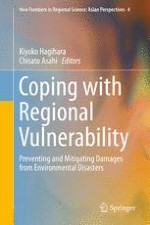2016 | OriginalPaper | Buchkapitel
2. Water Resources Conflict Management: Social Risk Management
verfasst von : Yoshimi Hagihara, Kiyoko Hagihara
Erschienen in: Coping with Regional Vulnerability
Verlag: Springer Japan
Aktivieren Sie unsere intelligente Suche, um passende Fachinhalte oder Patente zu finden.
Wählen Sie Textabschnitte aus um mit Künstlicher Intelligenz passenden Patente zu finden. powered by
Markieren Sie Textabschnitte, um KI-gestützt weitere passende Inhalte zu finden. powered by
